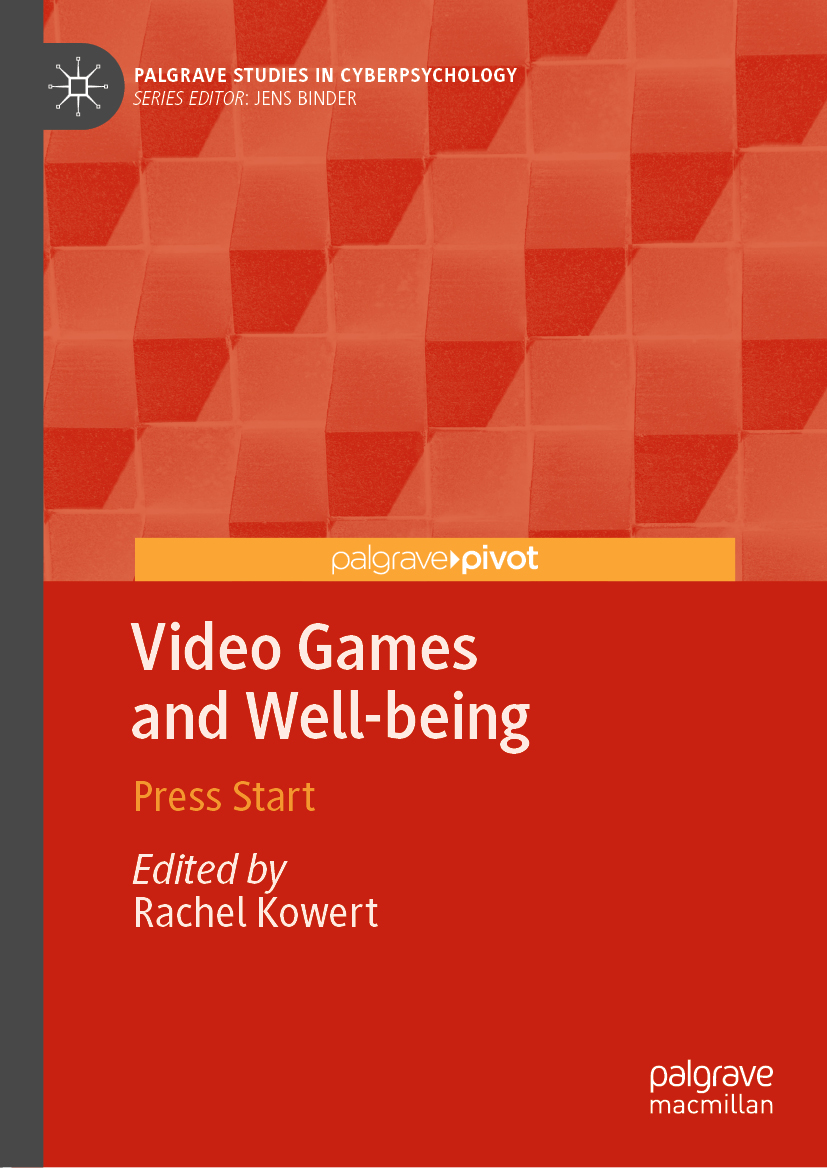Editor
Rachel Kowert
Take This, Seattle, WA, USA
Palgrave Studies in Cyberpsychology
ISBN 978-3-030-32769-9 e-ISBN 978-3-030-32770-5
https://doi.org/10.1007/978-3-030-32770-5
The Editor(s) (if applicable) and The Author(s), under exclusive license to Springer Nature Switzerland AG 2020
This work is subject to copyright. All rights are solely and exclusively licensed by the Publisher, whether the whole or part of the material is concerned, specifically the rights of translation, reprinting, reuse of illustrations, recitation, broadcasting, reproduction on microfilms or in any other physical way, and transmission or information storage and retrieval, electronic adaptation, computer software, or by similar or dissimilar methodology now known or hereafter developed.
The use of general descriptive names, registered names, trademarks, service marks, etc. in this publication does not imply, even in the absence of a specific statement, that such names are exempt from the relevant protective laws and regulations and therefore free for general use.
The publisher, the authors and the editors are safe to assume that the advice and information in this book are believed to be true and accurate at the date of publication. Neither the publisher nor the authors or the editors give a warranty, expressed or implied, with respect to the material contained herein or for any errors or omissions that may have been made. The publisher remains neutral with regard to jurisdictional claims in published maps and institutional affiliations.
This Palgrave Pivot imprint is published by the registered company Springer Nature Switzerland AG
The registered company address is: Gewerbestrasse 11, 6330 Cham, Switzerland
Foreword
Its late morning on a cloudy Saturday morning and my daughter is solidly into hour two of iPad timethis morning itsRoblox(Roblox Corporation, 2005). I might feel guilty, but its early and Im tired. Also, shes got something shereallywants me to see, and then she wants to show me the rest of her world (which usually involves wings, water, and home furnishings). Three days later, shes got out our old Nintendo DS and is playingAnimal Crossing(Nintendo, 2001). When I come to her to tell her to get off, she stops me, saying,
Wait, momma, do you want to see all the things Ive built in the town?
And so I take a deep breath and sit down to look over her shoulder at a bad angle and see what shes made. In five minutes shell transition to practicing her ukulele and Ill sit on the couch playingAlphabear 2(Spry Fox, 2018) on my phone and listen to her awkwardly work through a new set of chords.
My daughter gets the same sense of mastery, the same creative experience, in all three of these settings. And, as this book notes, so do many, many other people. Digital games are new(ish) cousins to board games and playground games and theater games all alike, with both similar and totally new ways of providing players with a range of opportunities to develop skills, explore their inner and outer worlds, and see models for human interaction. What this book does so masterfully is to consider these models through careful parsing of the real evidence out thereinstead of descending into a moral panic about screens, digital content, and online interaction.
In my work, Im constantly talking to people who live and breathe games, and for whom digital gaming worlds are full of joy, fun, and delight. And so often, these loves exist alongside passions for gardening, or skiing, or theater, or bodybuilding.
We need good guidance, backed by good science, on how to help everyoneparents, kids, adultsunderstand what games can and cannot do, what they do and do not offer in terms of skill building and learning, and how they speak to and shape cultural norms and conversations. For example, in my work in the field of mental health there is fascinating early evidence about the role of games in supporting the development of skills and enabling a sense of value, achievement, and satisfaction among people with few other opportunitiesnot to mention the sheer joy people experience while playing.
Play has always been an essential element of human lifelets catch up to our use of it in a digital context. It is time we recognize, understand, and celebrate the ways in which games add to cultural conversations, promote play, mastery, and creativity, and help people enjoy their lives. Im probably going to stick mostly to my cooking and yoga and backpacking, but youll find me to be a longtime devotee of a couple of games (and a loyalist to the ones my husband makes!) and an avid watcher of the games my husband and daughter like to play.
Executive Director,Take This
Seattle, USA
References
Nintendo. (2001).Animal Crossing[Video game]. Nintendo Co.
Roblox Corporation. (2005).Roblox[Video game]. Roblox Corporation.
Spry Fox. (2018).Alphabear 2[Video game]. Spry Fox.
Eve Crevoshay
Eve Crevoshay
is the executive director of Take This, whose mission is to decrease the stigma, and increase the support for, mental health in the game enthusiast community and inside the game industry. She is a 15-year veteran of the nonprofit sector, with a focus on fundraising and executing strategy. Her background spans education, social services, and the arts. Shes also a yoga teacher, avid gardener and cook, and gamer. She lives in Seattle area with her husband, daughter, and two dogs.
Acknowledgements
Thank you to everyone who helped bring this project to life. Your hard work has provided a solid first step in shifting the focus away from whether or not video gamesharm usand towards how and why video gameshelp usgrow, learn, and thrive.
Contents
Felix Reer and Thorsten Quandt
Chelsea Hughes

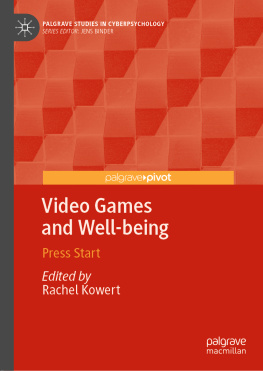
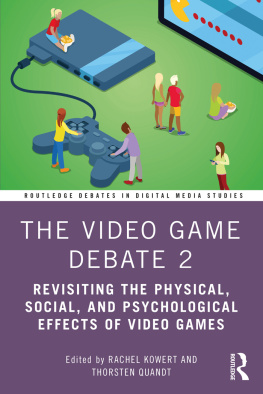

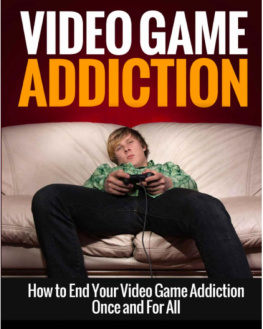
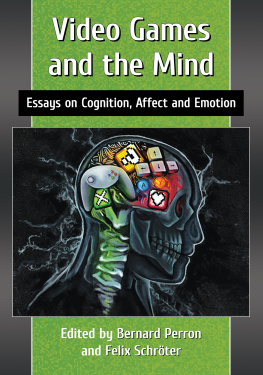
![Mark J. P. Wolf (editor) - Encyclopedia of Video Games: The Culture, Technology, and Art of Gaming [3 volumes]](/uploads/posts/book/279290/thumbs/mark-j-p-wolf-editor-encyclopedia-of-video.jpg)
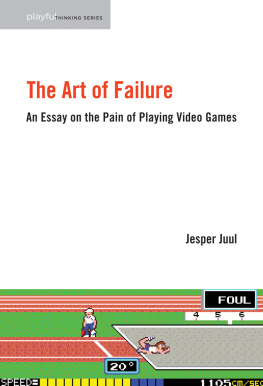
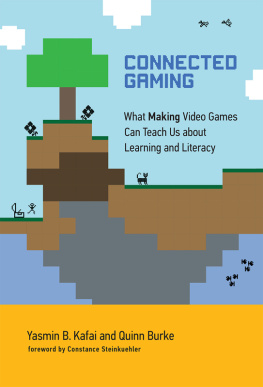
![Ethan Ham [Ethan Ham] - Tabletop Game Design for Video Game Designers](/uploads/posts/book/119417/thumbs/ethan-ham-ethan-ham-tabletop-game-design-for.jpg)

